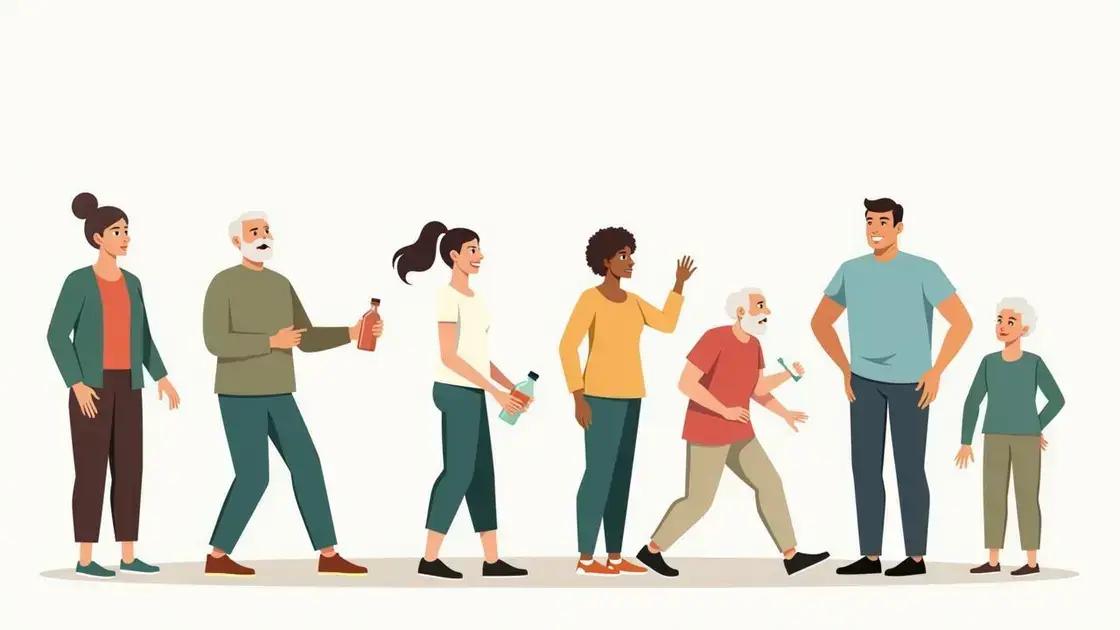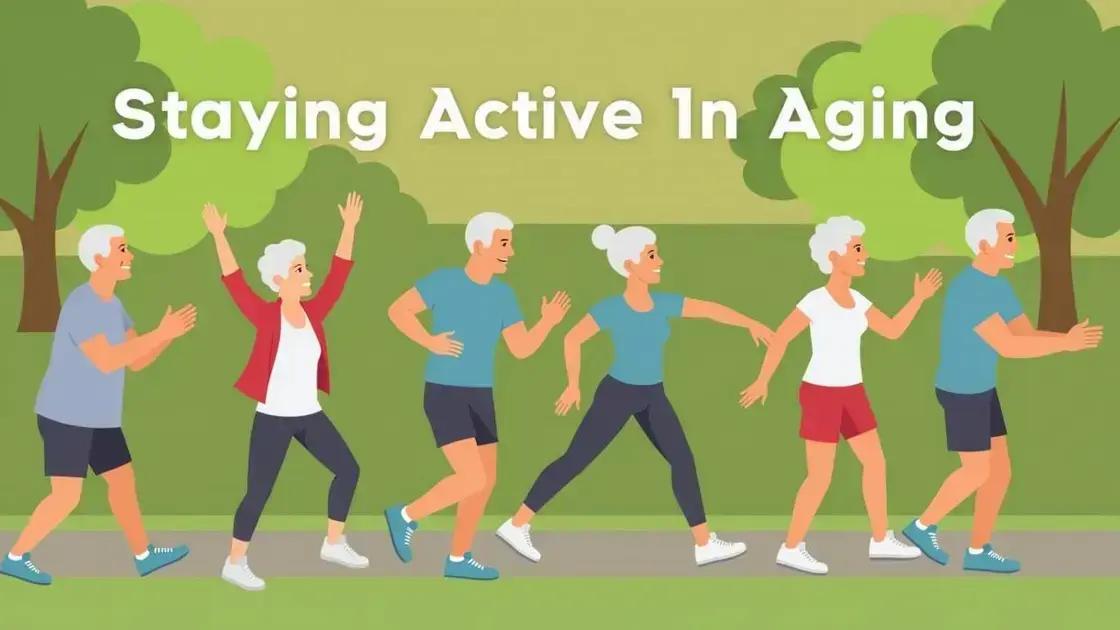To manage weight gain during aging, focus on understanding the causes such as slowed metabolism and hormonal changes. Adopt healthy eating habits, incorporate regular physical activity, and practice mindfulness techniques to promote a balanced lifestyle and maintain overall health.
As we age, many individuals struggle with weight gain, often leading to health concerns. Understanding how to manage weight gain during aging is crucial for maintaining overall health and vitality. In this article, we will explore the causes of weight gain in older adults and provide practical tips, including healthy eating habits, staying active, and incorporating mindfulness into your daily routine.
Understanding Weight Gain Causes in Aging

Weight gain during aging can be linked to several factors that change as our bodies grow older. Understanding these causes is important for managing weight effectively.
Metabolism Slows Down
As we age, metabolism naturally slows down. This means our bodies burn calories more slowly than they did in younger years. Consequently, if we continue to eat the same amount without adjusting portion sizes or food choices, weight gain can occur.
Hormonal Changes
Hormonal changes play a significant role in weight gain as we age. For women, menopause leads to a decrease in estrogen levels, which can result in fat being stored more in the abdomen rather than hips or thighs. Men also experience changes in testosterone that can affect muscle mass and body fat distribution.
Decreased Physical Activity
Many older adults become less active due to various factors such as health issues, boredom, or lifestyle changes. This decrease in physical activity leads to fewer calories being burned, often resulting in weight gain if dietary habits do not change.
Changes in Muscle Mass
Muscle mass tends to decline with age, a phenomenon known as sarcopenia. Since muscle burns more calories than fat, a lower muscle mass means a lower daily calorie requirement. To counteract this, it is important to incorporate strength training into your routine.
Being aware of these factors can help you create a strategy to manage weight gain effectively as you age.
Healthy Eating Habits for Older Adults

Eating healthy is crucial for older adults, as it can help maintain energy levels and manage weight. Here are some healthy eating habits to consider:
Incorporate a Variety of Foods
Include a wide range of food groups in your diet. Eating a mix of fruits, vegetables, whole grains, lean proteins, and healthy fats ensures you get the essential nutrients your body needs.
Focus on Portion Control
As metabolism slows with age, practicing portion control becomes essential. Using smaller plates or measuring serving sizes can help keep portions in check, preventing overeating.
Stay Hydrated
Older adults often have a reduced sense of thirst. It’s important to drink enough water throughout the day, aiming for at least 8 glasses. Incorporating foods with high water content, like fruits and vegetables, can also contribute to hydration.
Limit Processed Foods
Avoid foods high in added sugars, unhealthy fats, and salt. Instead, opt for whole, minimally processed foods. Reading labels can help you make better choices when shopping for groceries.
Mind Your Nutrient Intake
Pay attention to important nutrients like calcium, vitamin D, and fiber. Foods rich in these nutrients can support bone health, improve digestion, and keep your heart healthy.
By adopting these healthy eating habits, older adults can enjoy a balanced diet that supports their overall health and helps manage weight effectively.
Importance of Physical Activity in Aging

Physical activity is essential for older adults, as it brings numerous benefits to both physical and mental health. Regular exercise can help combat the effects of aging and weight gain, making it a vital part of a healthy lifestyle.
Benefits of Staying Active
Engaging in physical activity helps maintain muscle strength and bone density. Strength training exercises, such as weight lifting, are effective in preserving muscle mass, which declines with age.
Improved Heart Health
Cardiovascular health improves with regular physical activity. Activities like walking, swimming, or cycling help strengthen the heart, lower blood pressure, and reduce the risk of heart disease.
Enhanced Mood and Mental Well-being
Being active can greatly boost mental well-being. Regular exercise releases endorphins, which can alleviate feelings of depression and anxiety. It also helps improve cognitive function and keeps the mind sharp.
Weight Management
Participating in physical activity is vital for weight management. Exercise burns calories, helping prevent weight gain while allowing older adults to enjoy their favorite foods. Regular movement can also help increase metabolism, making it easier to maintain a healthy weight.
Social Connections
Joining exercise classes or groups can provide valuable social connections. Engaging with others in physical activity helps combat loneliness and isolation, enhancing overall life satisfaction.
Incorporating physical activity into daily routines is key to enjoying a healthier, more vibrant life as you age.
Mindfulness and Weight Management Techniques

Practicing mindfulness can be a powerful tool for managing weight effectively, especially as we age. By being more aware of our eating habits and emotional triggers, we can make healthier choices.
Understanding Mindfulness
Mindfulness is the practice of being present in the moment. It involves paying full attention to your thoughts, feelings, and bodily sensations without judgment. This awareness can play a significant role in weight management.
Mindful Eating Techniques
One effective technique is mindful eating. This means slowing down during meals, savoring each bite, and recognizing hunger and fullness cues. By focusing on the experience of eating, you are less likely to overeat or choose unhealthy foods.
Recognizing Emotional Triggers
Mindfulness can help identify emotional triggers that lead to overeating. Many people eat in response to stress, boredom, or sadness. By recognizing these feelings, individuals can develop healthier coping strategies, such as going for a walk or practicing deep breathing instead of reaching for food.
Setting Intentions
Setting clear intentions for meals can also help in weight management. Before eating, take a moment to think about your goals and what you hope to achieve during the meal. This pause can guide more conscious choices.
Incorporating Mindfulness into Daily Life
Incorporate mindfulness practices into daily routines, such as meditation or yoga. These practices not only promote relaxation but also improve self-awareness, making it easier to stay on track with healthy eating habits and overall wellness.
By integrating mindfulness into your approach, you can foster a healthier relationship with food and better manage weight during aging.
Strategies for Managing Weight Gain During Aging
As we age, managing weight gain becomes increasingly important for maintaining health and vitality. By understanding the causes of weight gain during aging, adopting healthy eating habits, staying physically active, and practicing mindfulness, older adults can take proactive steps toward their well-being.
Incorporating a variety of nutritious foods, controlling portion sizes, and ensuring adequate hydration are essential. Regular physical activity not only boosts physical health but also enhances mood and mental well-being. Mindfulness plays a crucial role by helping individuals connect with their eating habits and emotional triggers.
By combining these strategies, older adults can effectively manage their weight while enjoying a fulfilling and active lifestyle. Taking charge of your health today can lead to a healthier tomorrow.
FAQ – Frequently Asked Questions about Managing Weight Gain During Aging
What are the main causes of weight gain as we age?
Weight gain in aging occurs due to factors such as slowed metabolism, hormonal changes, decreased physical activity, and loss of muscle mass.
How can healthy eating habits help older adults manage their weight?
Healthy eating habits, like incorporating a variety of foods and practicing portion control, are essential for maintaining energy levels and preventing overeating.
Why is physical activity important for older adults?
Physical activity promotes cardiovascular health, maintains muscle mass, enhances mood, and is crucial for managing weight effectively as we age.
What is mindfulness and how does it help with weight management?
Mindfulness involves being present and aware of your thoughts and feelings. It helps identify emotional eating triggers and promotes healthier eating behaviors.
What types of physical activities are beneficial for older adults?
Activities like walking, swimming, yoga, and light strength training are great ways for older adults to stay active and healthy.
How can I start incorporating mindfulness into my daily routine?
You can start practicing mindfulness by setting aside a few minutes for meditation, focusing on your breath, or trying mindful eating during meals.













